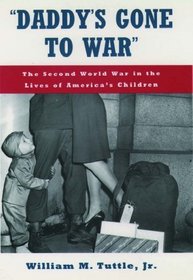This book isn't what I expected---hoped?---it to be. Sometimes I felt like I was reading a sociology textbook. Still, I have to admit I learned a lot. And while the main topic was children, it also, of necessity, often covered their parents too.
I was somewhat shocked to learn that after the war, when "Daddy" returned, there were hundred of thousands of divorces over the next two years. I never knew there were that many. Plus, one of the greatest challenges to the children was that over just two of the early years of the war over 30 million Americans migrated to other parts of the country, due to military assignments or civilian jobs. When you consider the population of the U.S. at that time was 150 million, this migration had a huge effect on individual families as well as the entire country.
One of the biggest changes in American culture was the eventual acknowledgement for widespread child care, including medical assistance, provided by local and national governments. As you might expect, there was widespread opposition to this, but in the end it proved its worth.
And, just as it somewhat did due to Covid, beginning in November 1942, under the Servicemen's Dependence Allowance bill, the U.S. government mailed monthly assistance checks to families with men in the service. The amount depended on how many children there were in the family. Wives got $28, the first child rated $12 more, with $10 for each additional child.
One interesting tidbit for this former Marine was the efforts of youngsters to actively support the war by joining the military. The book mentions that in 1988 President Reagan signed a bill granting Calvin Graham, a Marine veteran of Guadalcanal, disability payments he was denied by the Navy because he lied about his age when he enlisted at the age of twelve. What! I could never have imagined doing so when I was twelve. I have no idea how he made it through boot camp.
I was somewhat shocked to learn that after the war, when "Daddy" returned, there were hundred of thousands of divorces over the next two years. I never knew there were that many. Plus, one of the greatest challenges to the children was that over just two of the early years of the war over 30 million Americans migrated to other parts of the country, due to military assignments or civilian jobs. When you consider the population of the U.S. at that time was 150 million, this migration had a huge effect on individual families as well as the entire country.
One of the biggest changes in American culture was the eventual acknowledgement for widespread child care, including medical assistance, provided by local and national governments. As you might expect, there was widespread opposition to this, but in the end it proved its worth.
And, just as it somewhat did due to Covid, beginning in November 1942, under the Servicemen's Dependence Allowance bill, the U.S. government mailed monthly assistance checks to families with men in the service. The amount depended on how many children there were in the family. Wives got $28, the first child rated $12 more, with $10 for each additional child.
One interesting tidbit for this former Marine was the efforts of youngsters to actively support the war by joining the military. The book mentions that in 1988 President Reagan signed a bill granting Calvin Graham, a Marine veteran of Guadalcanal, disability payments he was denied by the Navy because he lied about his age when he enlisted at the age of twelve. What! I could never have imagined doing so when I was twelve. I have no idea how he made it through boot camp.




